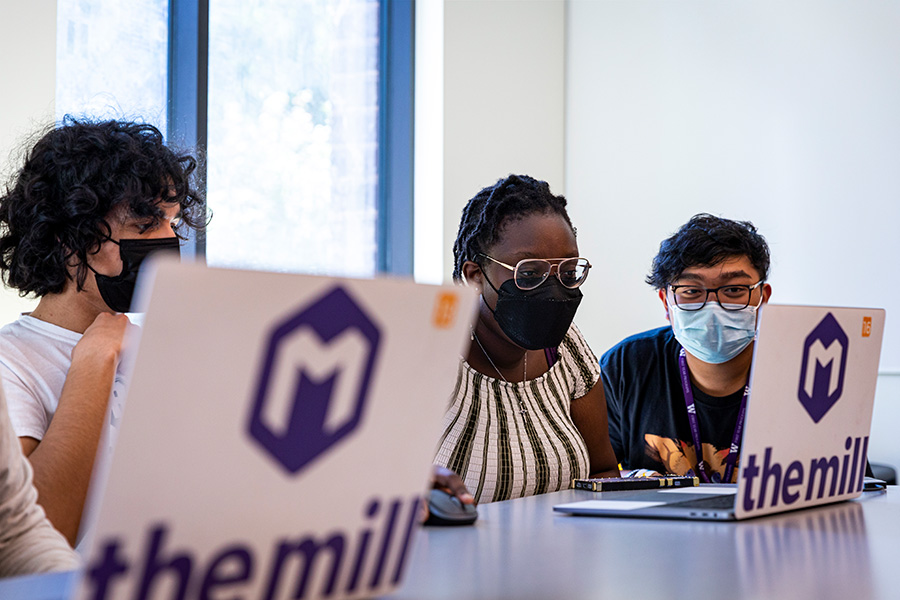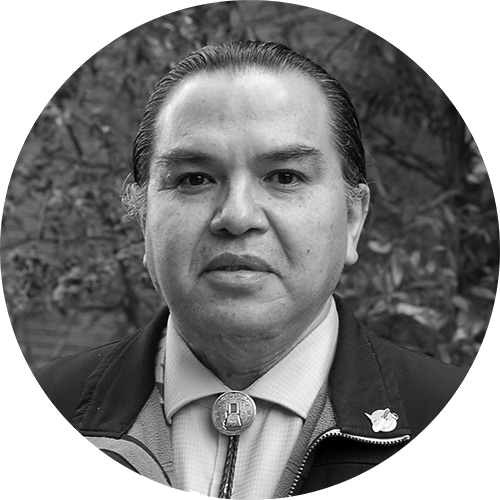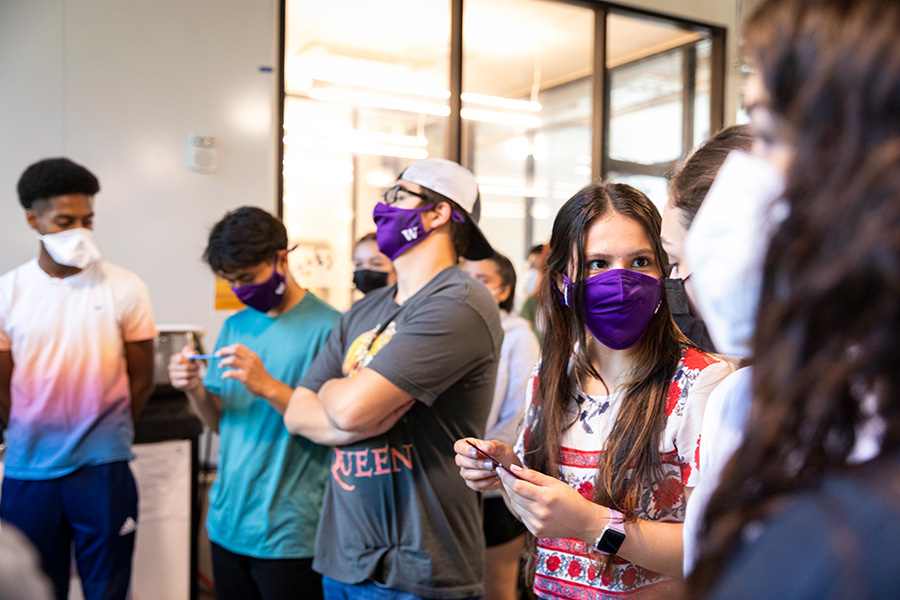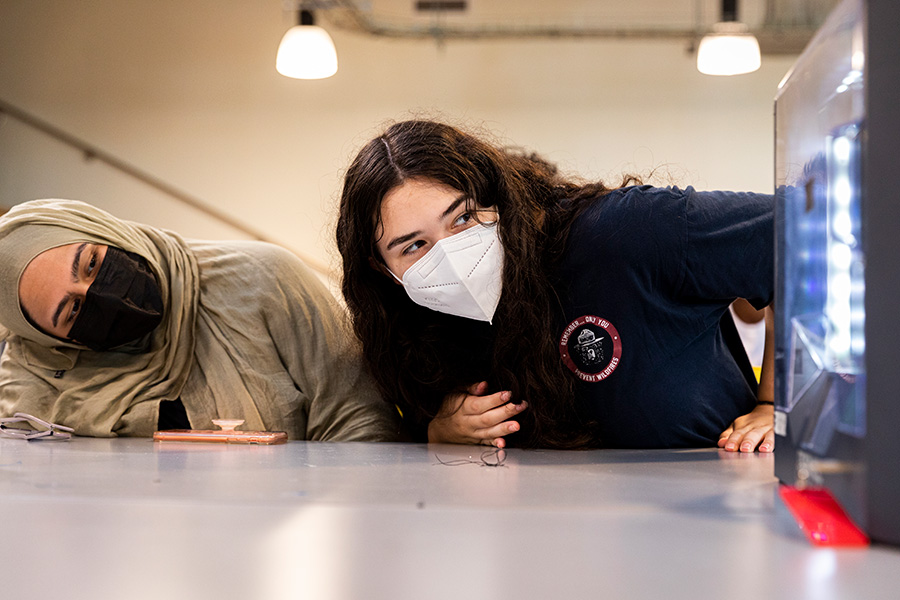By Chelsea Yates
Photos by Mark Stone / University of Washington
One of the College’s Pathways for Inclusive Excellence, the Engineering Dean’s Scholars Program is making it possible for more Washington students to become engineers.

Engineering Dean's Scholars work on computers in The MILL, a campus makerspace and learning facility.
A field trip to the Kennedy Space Center ignited Jayden Shafer’s interest in aerospace engineering.
“After that, I knew I wanted to be an engineer,” says Shafer, who grew up near Tri-Cities, Washington. “I also knew I wanted to attend the UW.”
Upon starting high school, Shafer became concerned about reaching his goal. “My school had limited math and science offerings,” he recalls. “There were no chemistry classes, and the most advanced math class I could take was algebra.”
He applied to the UW anyway, citing engineering as his top choice of study. In 2021, he was one of approximately 50 students admitted to the College of Engineering as an Engineering Dean’s Scholar. Launched that same year, the Engineering Dean’s Scholar program (EDS) supports Washington state students who show they have the potential to become excellent engineers but may need an extra boost to get there.
“EDS is for students across the state who want to study engineering but may not have the academic background, familiarity with engineering or support to succeed as engineering students at the UW,” says Scott Pinkham, who directs the program.

“Our goal is to help students understand what engineers do, provide them with the academic support and resources they may need, and help them understand they’re not alone in the transition to life as an engineering student.”
Along with STARS and Allen School Startup, EDS is part of the College’s Pathways for Inclusive Excellence (PIE), an initiative that provides underserved students from Washington state opportunities to pursue engineering and computer science in a supportive environment that is committed to their academic success.
The three PIE programs focus on holistic programming and support starting the summer after high school and through the first or second year at the UW. Students who complete one of the three programs are guaranteed entry into an engineering or computer science major.
Building community is a central tenet of all three PIE programs.
“Our goal is to help students understand what engineers do, provide them with the academic support and resources they may need, and help them understand they’re not alone in the transition to life as an engineering student,” Pinkham says.
Acceptance, belonging, community
EDS starts with the Summer Transition Program, a preparatory experience that takes place before the fall quarter begins. Students are immersed in math and chemistry workshops as well as social and team building activities. They also meet with professors from across the College and with professionals working in industry.

During the Summer Transition Program, EDS students take part in workshops and community building activities on campus before classes start.
“The Summer Transition Program is designed to help students learn about themselves and how to navigate the UW, establish a path to graduation and build a network of peers they can share the journey with,” Pinkham says. “We work to instill the importance of self-awareness and a growth mindset so students are more resilient and will persist in their engineering studies.”
For Dean’s Scholar and environmental engineering major Fiona Clayton, the Summer Transition Program was a game-changer.
“I went to an engineering-focused high school so I thought I was ready for classes, but wow did the Summer Transition Program give me an academic boost I didn’t know I needed,” she says. “It’s also where I first met my EDS cohort. If I hadn’t had that community my first year at the UW, I would have had a hard time surviving.”
The best part has been having an established cohort of peers, for homework and study groups as well as for socializing and friendships. It’s helped make a big place like the UW seem less intimidating and lonely.”
During their first academic year, the Dean’s Scholars attend supplemental math and science workshops alongside their core studies. The students study together and attend events, such as industry talks and tours. Students are paired with an engineering adviser who helps them with everything from exploring engineering majors and creating academic plans to navigating housing, identifying scholarship opportunities, and finding clubs and student groups to join.
“Once the school year started, I struggled at first but the supplemental workshops helped me get on track,” Shafer says. “Thanks to my peers and to EDS, I felt more determined to stay on top of my homework.”
Engineering Dean’s Scholar Holland Kantner agrees. He grew up in Belfair, Washington, an unincorporated community on the Olympic Peninsula, and wanted to attend the UW so he could stay close to family.
“For me the best part has been having an established cohort of peers, for homework and study groups as well as for socializing and friendships,” the aeronautics and astronautics undergraduate says. “It’s helped make a big place like the UW seem less intimidating and lonely.”
Making the most of a first-year program

Engineering Dean's Scholars anticipate the output of a 3D printing project as part of the Summer Transition Program.
Shafer, Kantner and Clayton all say that since the program is focused on the first year, it’s important to take advantage of all of the resources and opportunities it provides.
Clayton is especially thankful that EDS introduced her to the Engineering Academic Center, which offers exam review sessions and tutoring to all UW engineering students. “I feel confident that the support staff is always going to be in my corner,” she says.
Shafer, who is also majoring in aeronautics and astronautics, recently completed a summer internship on a product development team at Boeing. He learned about the opportunity through EDS.
“I didn’t think I had a chance of getting an internship, but Scott and other staff members encouraged me to apply,” he says. “They’re really there to help you access opportunities and feel like you belong in engineering.”
For Kantner, one of the key takeaways has been a deeper understanding of diversity — across people and the field.
“Overall, EDS exposed me to so much difference, in terms of people’s backgrounds, types of engineering, research, jobs and opportunities,” he says. “It helped me relax the idea that I need to lock into one area and instead consider engineering in a much broader way.”
Pathways for Inclusive Excellence
The College of Engineering is committed to providing underserved students from Washington state opportunities to pursue engineering and computer science in a supportive environment dedicated to their academic success.
Originally published September 26, 2022